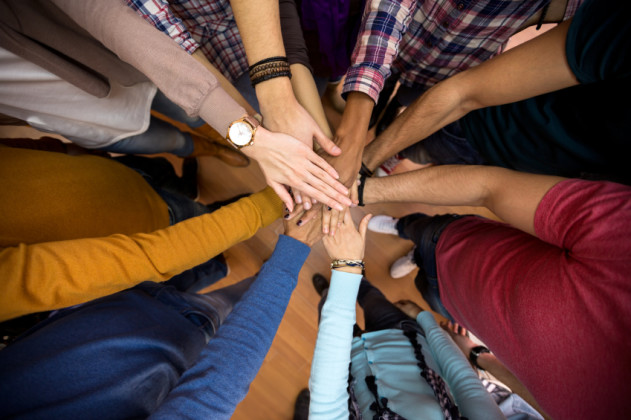Parental leave and workplace flex time, while extremely important, only go so far. It’s clear that the one thing facing all families today is that parents are struggling to do it alone and do it well.
In 2001, Andrea Yates, a Houston mother suffering from postpartum depression and psychosis, drowned her five children in the bathtub, calmly called her husband and then the police to confess. The case brought intense media attention and societal outrage; how could a mother do such a thing? Yet for lauded sociobiologist Sarah Blaffer Hrdy, Yates’ situation brought to light a much larger discussion—why was a psychologically distressed mother left to care for her children without any social or institutional support?
That isn’t how it should be, according to Hrdy. And for thousands of years, it actually wasn’t that way. For Hrdy, female cooperative breeding, or alloparenting—the “sharing and caring derived from the pooled energy” of a network of “grandparents, aunts, uncles, siblings, distantly-related kin, and non-kin”—shaped human evolution. Others support her study, stating “broader cooperative networks within and between the sexes provide the primary basis for our unique life history.”
While modern life is far removed from the ways things were millions of years ago, one thing remains—children still need supportive, loving, and consistent care until they are able to care for themselves.
You don’t have to do much research to see how today’s children are doing. Millions of children are being raised in poverty, which numerous studies indicate affects their health, wealth, and education throughout their lives. Children at the other end of the spectrum, under intense pressure to succeed and get into the right colleges, are committing suicide at alarming rates as Hanna Rosin recently documented in the Atlantic.
Thankfully, not many meet the fate of Andrea Yates’ children, but about 500 children a year are murdered by their parents in the United States, and millions more are abused and neglected by their parents. All too often, a lot of damage is done before they can receive help.
But their parents don’t seem to be doing much better. Considering that many parents today are dual-income couples, they’re facing the pressures of the elusive work-life balance. At the same time, having children, as All Joy and No Fun: The Paradox of Modern Parenthood author Jennifer Senior notes, causes more conflict between couples than anything else—money, work, in-laws, chores, annoying habits, communication styles, and sex. No wonder parents are just as stressed as their children.
Parental leave and workplace flex time, while extremely important, only go so far. It’s clear that the one thing facing all families today—whether they’re hetero, same-sex, single, married, or cohabiting—is that parents are struggling to do it alone and do it well.
Which is why it’s time society brings back and embraces the concept of alloparenting. As an old African proverb states, “It takes a village to rise a child.”
If more people shared in childrearing, all children—whether growing up in poverty or in stressed-out or abusive families—would benefit. They’d have a network of people invested in their life from whom they could learn. Not only would it expose them to various life experiences and lifestyles, but it would also likely encourage empathy and an open mind toward other’s beliefs and values as they became adults.
University of Sheffield, England, philosophy professor Anca Gheaus has been exploring what kind of childrearing would best address children’s rights and emotional needs. She suggests all children should have quality and trained caregiving that is nonparental, continuous and, perhaps most important, mandatory.
Not only would it give children what they need, but it would also be a huge relief to parents. If they knew they had a trusted, kind network of caregivers, they would likely feel less overwhelmed—especially if their children have learning or physical challenges or if they have erratic work schedules or they are single parents. It also would give them time for themselves, which few parents, especially single parents, have.
There are a number of ways to create this. It could occur in schools, which could add quality, regulated and trained caregiving to their academic agenda, creating a network of mentors whom children can turn to throughout their education and, ideally their life. It also could take the form of nonreligious formalized godparenting, in which caregivers who signed up as volunteers or as a “service” along the lines of AmeriCorps, would be trained and assigned to help care for children a few hours a week for several years. It could also be a requirement once citizens, men and women, turn 18, as the draft was at one point in the United States and as military service is required in Israel. Not only would this be a way for people to contribute to the good of their society, but it also could provide them with perks, whether free education or guaranteed caregiving in their old age. And because men would be required to participate, it would elevate caregiving, which, although an essential part of society, has generally be seen as women’s work and thus undervalued and underpaid.
If we really care about our future, we need to rethink the way we caregive those who need it most—society’s most vulnerable. The ancient concept of alloparenting may be our best future.
Vicki Larson is an award-winning journalist and co-author of “The New I Do: Reshaping Marriage for Skeptics, Realists and Rebels” (Seal Press, Sept. 28, 2014). Keep up with her take on marriage, divorce and parenting on her blog, OMG Chronicles, on Twitter and Facebook.
Other Links:

